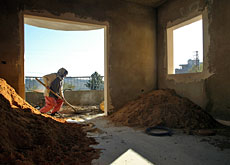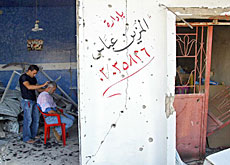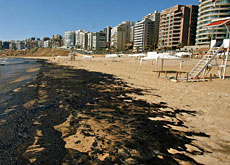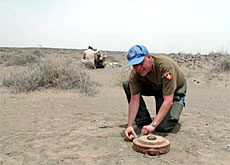Swiss scale down Lebanon recovery programme

Switzerland plans to reduce its relief activities in Lebanon, after successfully completing aid operations in the region.
But experts warn that cluster bombs could jeopardise the return of refugees to their homes in the south.
The top Swiss foreign ministry aid official says he’s very pleased with the result of a humanitarian mission in the wake of last year’s conflict in Lebanon.
“We have very concrete, measurable results from these aid programmes – supporting people with cash for repairs, livelihood support and contributing to the reconstruction of water supply systems and schools,” said Toni Frisch, who heads the Swiss Humanitarian Aid Unit.
He was speaking after visiting a number of Lebanese villages that benefited from the Swiss aid, notably a special repatriation and relief programme.
“I have seen a positive and constructive spirit of people who want to reorganise themselves and move back to the villages under difficult circumstances. Many families are rebuilding homes, cultivating their land, or looking for a job,” Frisch told swissinfo.
Residents of seven villages, including Beni Hayan, Maroun ar Ras, Kaffra, Zebqin and Maarakeh, have received financial support to restart their communities, including cash for farmers and owners of small enterprises.
Schools
The water supply system was restored for about 8,000 people and Switzerland sponsored five medical containers to ensure access to treatment.
“The school programme has been an important one. For example, more than 60 schools have been rehabilitated benefiting 21,000 children. The schools were occupied by thousands of displaced people during the war,” Frisch added.
Frisch said Switzerland was reducing its relief programme over the next few weeks, for which the government had allocated an extra $11.5 million (SF14.4 million). But it would continue a number of activities including a contribution to the programme for Palestinian refugees and a de-mining campaign in southern Lebanon.
A Swiss expert is working for the United Nations Relief and Work Agency for Palestine and the foreign ministry has been financing a documentary film about Palestinian refugees.
De-mining
Lebanon’s national de-mining office told Frisch that over a 100-square-kilometre area in the south there are hundreds of thousands of unexploded devices – in all more than one million in the south of the country.
It will take them several years to clear them all.
“It is a serious problem, as people cannot work their land, there are cluster bombs in olive trees, children get hurt and handicapped playing on playgrounds,” Frisch warned.
Over one million refugees originally fled their homes but 80 per cent have returned to their badly damaged houses in the meantime, according to officials.
swissinfo

More
Swiss Agency for Development and Cooperation (SDC)
Israel and Hezbollah militias fought a month-long war that ended in August last year.
Some 1,200 civilians died in the conflict, according to UN estimates. 15,000 homes as well as bridges and roads were destroyed.
The Lebanese authorities have estimated total damage to infrastructure at $3.6 billion.
Switzerland has contributed a total of $16 million to humanitarian aid efforts in southern Lebanon, including $3.2 million for the International Committee of the Red Cross (ICRC).
The Swiss government granted a special credit of $11.5 million for relief efforts. A further $4.4 million has been earmarked to help Palestinians in the Israeli-occupied territories.
Swiss relief efforts included a repatriation programme, the restoration of water supplies, medical assistance, school rehabilitation, a clean-up operation on a natural reserve and the coastline.
Switzerland also stepped up aid for Palestinian refugees and supported de-mining efforts.

In compliance with the JTI standards
More: SWI swissinfo.ch certified by the Journalism Trust Initiative



You can find an overview of ongoing debates with our journalists here. Please join us!
If you want to start a conversation about a topic raised in this article or want to report factual errors, email us at english@swissinfo.ch.